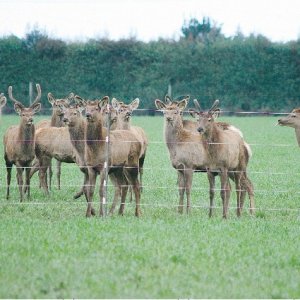In little more than three decades it has all but wiped out Bovine Tb in deer herds. Today, there are only four infected herds remaining in NZ.
Confining deer for farming brought challenging animal health issues, not least of which was Bovine Tb.
In those early days the industry attracted all sorts, including speculators and those seeking tax breaks. But there were also the genuine entrepreneurs, in it for the adventure and belief in the long term prospects, including export opportunities.
Back in the early 1980s a young Irish scientist was challenged by some farming mates to use his skills to help develop the fledgling industry.
It was a serendipitous call for Dr JFT (Frank) Griffin, an immunologist with the Otago University's Department of Microbiology, and he took up the challenge. It was the beginning of a long association between deer farmers, AgResearch (Invermay) and Otago University. Many believe it saved the industry.
The first project was to understand high death rates among live capture deer. Often they literally dropped dead with no obvious cause. Frank's research showed deaths were stress related. The problem could largely be overcome with free access to good water.
Delighted with that work, deer farmers pointed to a huge problem they faced with the rampant rise of Bovine Tb. Could he help?
Among the reasons for its spread were strong demand for deer and no formal Tb testing programme. Farmers weren't concerned where animals came from; they just wanted numbers. Some sourced stock from up to a dozen origins, include the West Coast where Tb was widespread.
In the South, farmers were well aware that as deer increased so did the prevalence of Bovine Tb. They were urgently searching for an answer. There was a comprehensive cattle testing programme but it wasn't working. Deer appeared to be just as susceptible.
In 1984 Frank recalled getting a call from James Innes, a well known South Canterbury deer farmer and one of the industry pioneers. There was to be a critical meeting in Invercargill to discuss the future of the industry and Frank's presence was important.
The meeting included industry heavyweights such as Walter Somerville, Tim Wallis, Peter Ryan, and Peter Elworthy, as well as Innes himself.
All agreed a more effective test for Tb was essential, and asked Frank to be involved. Money for research was put on the table. It was a turning point for the industry, as it was for Frank, who has gone on to become a Professor of Immunology at Otago University.
Since that vital meeting he has developed the Deer Research Laboratory, which is now known as the Disease Research Laboratory, and more effective blood-based Tb tests. These are ancillary tests to the now formal initial screening test. Frank undertook this work while continuing University research and lectures.
In the early days, when a deer was worth several thousand dollars, if the animal tested positive it was slaughtered and examined.
Unlike the cattle industry there was no compensation: deer farmers wore the cost.
The new test was more sensitive and specific than the skin test. Using the new test farmers were able to save valuable deer from slaughter that had a positive skin test due to exposure to Avium Tb and not Bovine Tb.
Frank's tests were also able to detect those deer so heavily infected they made the subtle skin test unreliable. These were diagnosed skin test negative but in reality were major sources of Tb infection. Identification and removal of these high risk animals was key in reducing the Bovine Tb threat.
With Tb virtually beaten, the focus has shifted to Johnes, another significant animal health issue here and overseas, for all ruminants. Again, colleagues point to Frank as an inspirational leader.
The Disease Research Laboratory is a small operation that has achieved some hugely successful outcomes. Its testing regimes are the model now used by many countries throughout the world.
Frank Griffin and his team which included Dr Colin Mackintosh from AgResearch have operated successfully in Canada, USA, South Africa, and Saudi Arabia. It is fitting that Frank has received many awards including recognition in the NZ Honours list and more recently with the NZ Royal Society 's Sir William Pickering Medal.

















